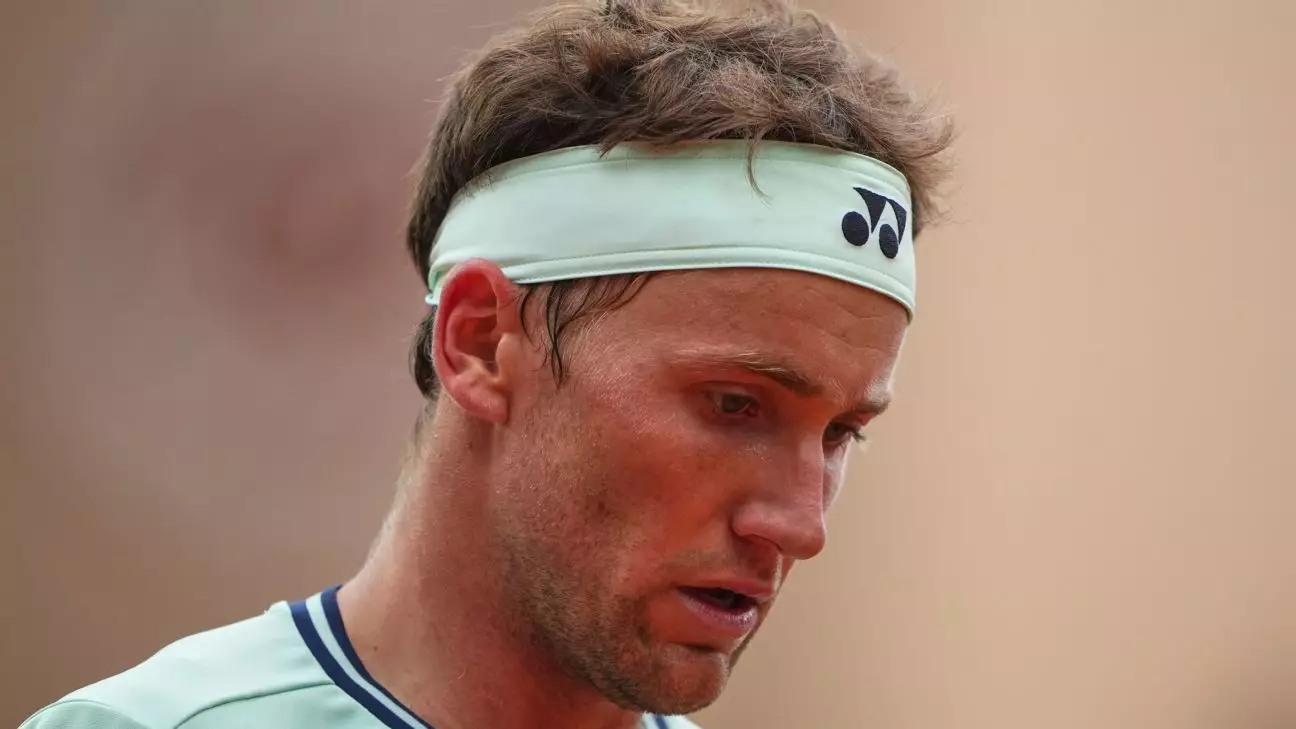In what can only be described as a heartbreaking second-round exit, Casper Ruud’s challenge at the French Open came crumbling down as he battled not just his opponent, Nuno Borges, but also a persistent knee injury that severely compromised his gameplay. Known for his remarkable tenacity and previous successes on clay, Ruud’s experience this year was marred by physical limitations that drastically undermined his performance. Dropping 13 out of the last 14 games and succumbing with a scoreline of 2-6, 6-4, 6-1, 6-0 not only points to a struggling athlete but also tells a poignant story of the mental and emotional challenges faced by elite players when their bodies don’t cooperate.
For Ruud, the French Open has historically been a stage of triumph; he reached the semifinals for the last three consecutive years, even finishing as the runner-up to legends like Rafael Nadal and Novak Djokovic. This latest exit represents a downturn that raises significant concerns not just about his current form but his overall long-term health as an athlete. The stark deviation from his previous performances, particularly as a seventh seed, highlights the sometimes invisible battles that take place behind the scenes in professional sports.
The Toll of Injury and Its Emotional Burden
Diving deeper into Ruud’s situation, his comments reveal the psychological strain that accompanies physical discomfort. The Norwegian player described how certain shots exacerbated his pain, particularly his open-stance backhand. This situation isn’t just about dealing with an injury; it’s about treading the fine line of competing at the highest level while being aware of one’s limitations. The often-unseen burden of pain can weigh heavily on an athlete’s mind, causing doubts and inhibitions that can overshadow their performance.
As anyone who has played a sport can attest, the instinct to push through pain can become a double-edged sword. Ruud’s reliance on painkillers and anti-inflammatory medication during the match underscores the desperation that can accompany the pursuit of excellence. The competitive spirit naturally drives athletes to try to ignore their vulnerabilities, but this can often lead to further injury or lack of performance.
Moreover, the emotional aspect becomes even more profound when we consider Ruud’s own remarks on his aspirations and the fond memories he holds regarding the tournament. His disappointment is palpable when he admits, “I wish I could stay here longer.” This powerful sentiment is reflective of not just his desire to compete, but also his connection to Roland Garros—a rite of passage for tennis players that encapsulates dreams, hopes, and years of hard work.
Alcaraz’s Fortitude Amidst Potential Upset
In stark contrast to Ruud’s struggles, Carlos Alcaraz displayed a blend of composure and determination, albeit with moments of vulnerability. Overcoming a rough patch in his match against Fabian Marozsan, Alcaraz bounced back to secure a victory reminiscent of his remarkable tenacity. His reflection on the match indicates an awareness of the ebbs and flows that can define a tournament. “In the second set,” he shared, “he started to play much better and he was really aggressive,” signaling the types of challenges that can unpredictably arise in high-stakes matches.
For Alcaraz, this encounter could have marked the onset of a troubling narrative—succumbing to an upset much like he experienced in Rome two years prior. Instead, he successfully turned the tide, which indicates not just skill, but mental fortitude. The ability to rally after encountering a difficult moment is a hallmark of great sportsmanship and speaks volumes about Alcaraz’s growth as a player.
A Bright Future Despite Rainy Challenges
Lorenzo Musetti’s journey this year offers yet another tale of resilience, further enriching the tapestry of dramatic narratives at Roland Garros. With a decisive 6-4, 6-0, 6-4 victory over Daniel Galan, Musetti demonstrated his command on the court, despite dealing with the unpredictability of intermittent rain showers. This grit showcases the spirit of survival that permeates through the sport, as conditions can change on a dime, demanding quick adaptations from players.
For Musetti, his ability to maintain focus throughout the match despite external distractions is commendable. His comments on solid performances affirm the belief that in each game, it is not only about skills but also about mental stability. The positives drawn from struggles, like Musetti’s “ups and downs during the first and third set,” highlight that the journey in tennis is about continuous improvement and the art of staying present despite adversities.
In the world of professional tennis, where physical ability often overshadows emotional resilience, the unfolding stories at Roland Garros serve as powerful reminders. Each match highlights the complexity of athletic challenges—both mental and physical—emphasizing the weight of aspirations, the agony of injuries, and the spirit of perseverance that ultimately defines champions.


Leave a Reply